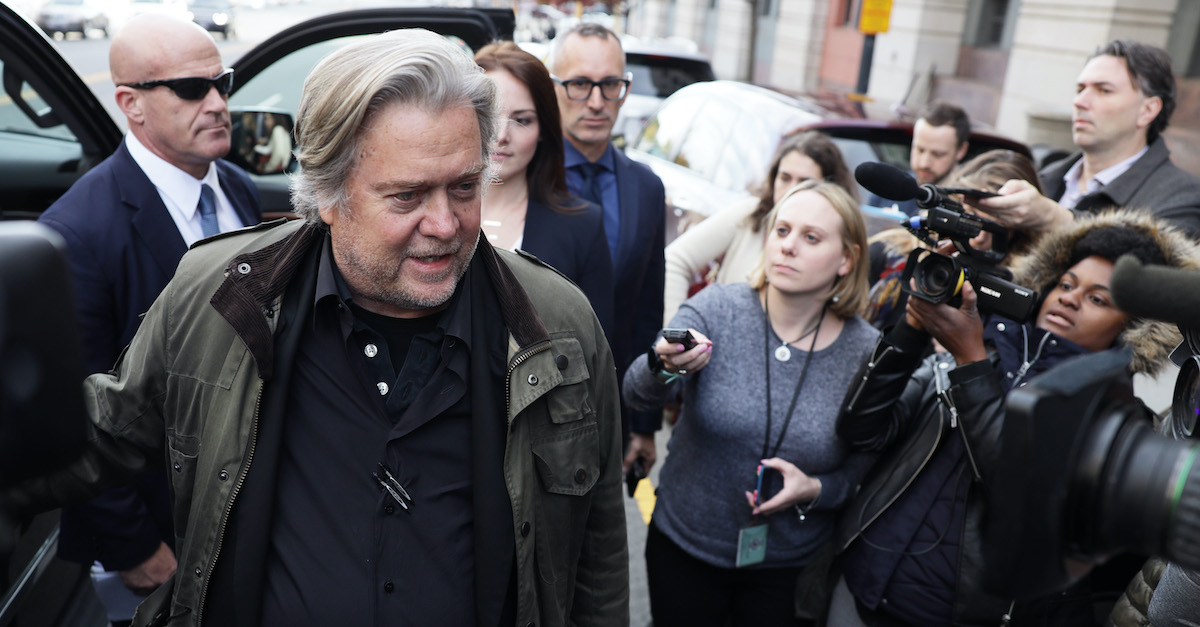
Steve Bannon is seen in a November 2019 file photo.
Former Trump 2016 campaign guru and White House advisor Steve Bannon made his first court appearance on Thursday afternoon after being arrested for wire fraud and money laundering earlier in the day.
The arraignment was a pro forma session that largely passed uneventfully–with the defendant consenting to various procedural asks posed by U.S. Magistrate Judge Stewart D. Aaron. Bannon declined a public reading of his indictment and eventually pleaded not guilty to the charges against him via video teleconference.
Quinn Emanuel attorney Bill Burck and another member of his firm appeared for the defendant.
Assistant U.S. Attorneys Nicholas Roos–who also took part in the prosecution of Michael Cohen–and Alison Moe–who is also currently prosecuting Ghislaine Maxwell–appeared for the Southern District of New York (SDNY).
Bannon’s arraignment quickly gave way to a congenial bail hearing.
The government and the defense agreed to a lenient bail package premised on terms that were previously agreed to by the government and Bannon.
Trump’s former strategic mastermind will be released later Thursday on a $5 million bond secured by $1.7 million in cash and/or property with co-signors.
Bannon’s travel will be restricted to the Southern and Eastern Districts of New York (effectively meaning Manhattan and Brooklyn)–as well as Washington, D.C., Maryland, Virginia and certain portions of Connecticut for work.
No international travel will be allowed–and he must surrender his travel documents such as his passport.
The agreement also states that Bannon will not be allowed to use private travel services like airplanes or boats without prior approval.
Bannon is also prohibited from making any contact with his co-defendants or anyone else associated with the controversial “We Build the Wall” campaign without prior court approval.
Additionally, Bannon is not allowed to raise any additional funds for the controversial private wall construction campaign–nor is he allowed to move any funds out of the campaign’s bank accounts.
The hearing tidily passed without much fanfare.
“We agree with the terms as laid out by the government,” Burck told the court.
Roos said that such agreements are typically hammered out within one week as the defendant obtains the necessary securities and signatures. Bannon’s defense attorney countered, asked, and received two weeks to secure Bannon’s bond conditions. September 3 is the deadline for Bannon to comply with the government’s proposed bail packages.
Pre-trial services was quizzed as to whether or not they have any issues or concerns with the conditions of release. Its representatives did not.
The conditions which were proposed and accepted were made in line with the Bail Reform Act of 1984–a piece of legislation which aims to “reasonably assure the appearance of the person as required and the safety of any other person and the community.”
There is currently a conference date set by SDNY Judge Analisa Torres for August 31 at 1:00 p.m.
Bannon was warned that if he jumped bail, he’d be charged with additional felonies.
“We have discussed with defense counsel a potential conflict issue,” Roos said, but added that he didn’t think it had any bearing on Thursday’s proceedings.
The conflict issue has to do with Bannon’s chosen defense counsel–but all sides declined to go into detail on that point.
[Photo by Alex Wong/Getty Images]